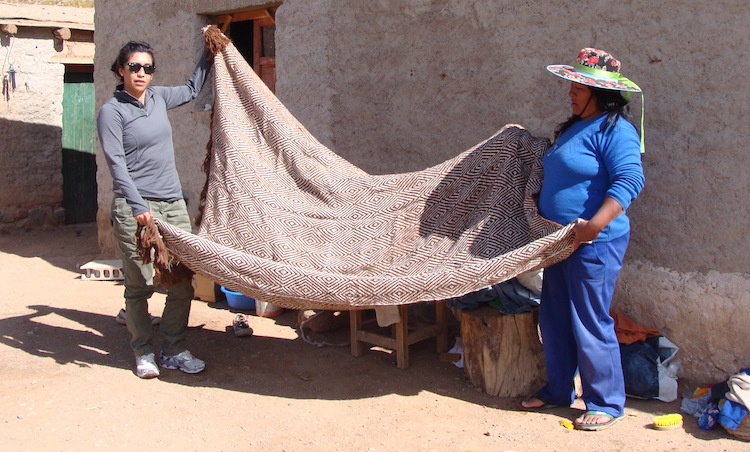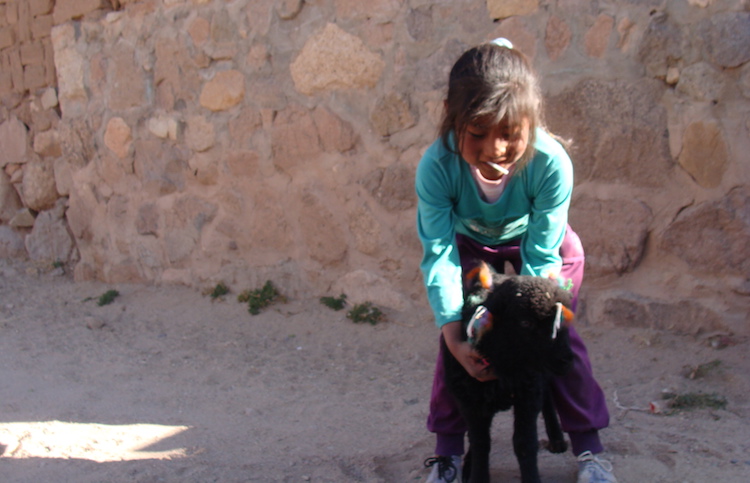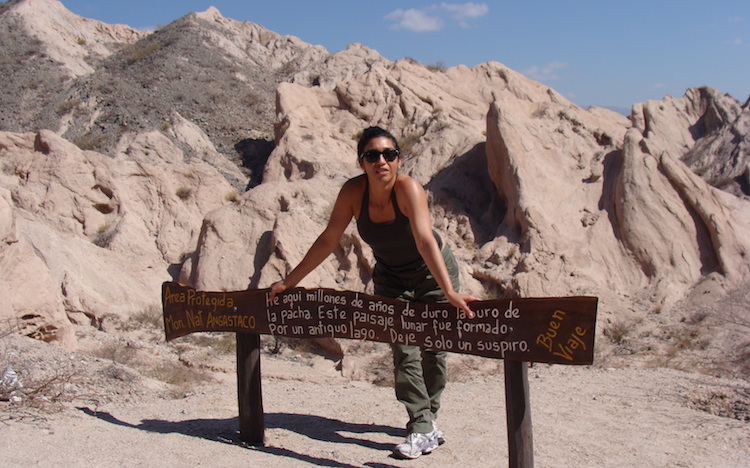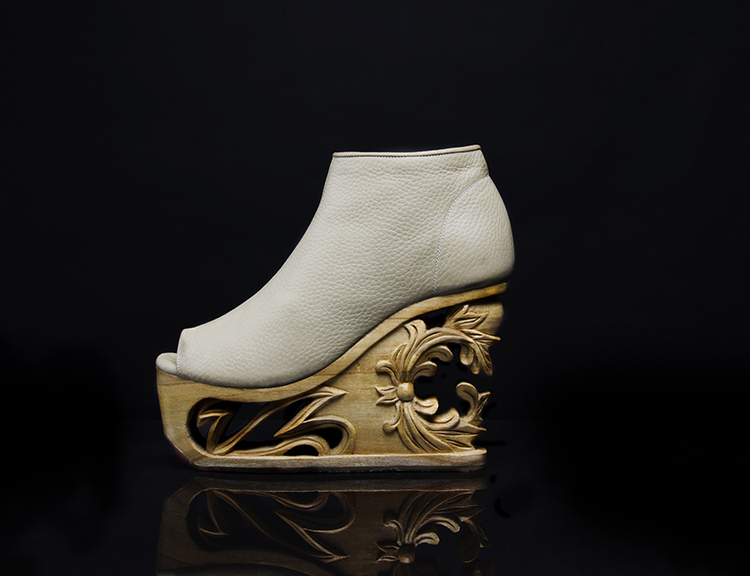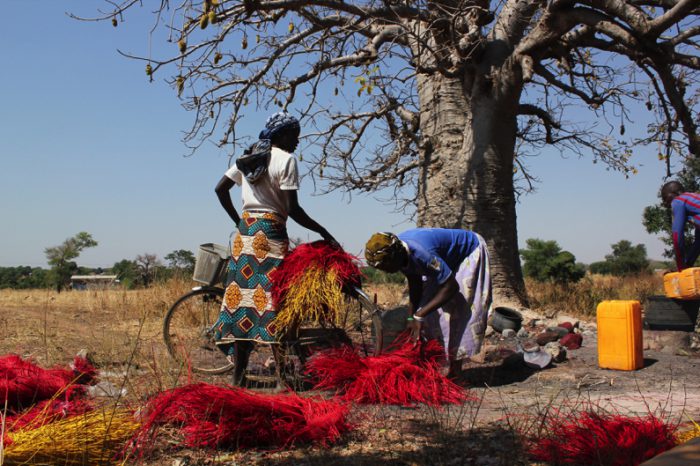Marcelo Ballesteros, age 50, has worked with animaná for two years now as the link between the company and the local artisans who live in more remote regions of the area. A retired marine, Marcelo now lives in the city of Salta, Argentina and was referred to animaná by a friend of the brand’s founder, Adriana Marina. Since he used to work with his father on pottery and crafted mats on handlooms as a child, he has prior knowledge of handicrafts. When Adriana asked if he would like to act as the connection between animaná and the artisans, Marcelo accepted the offer as an amazing chance to explore and meet new people.
“A day of work for me is never the same as the other.”
Generally, Marcelo’s day begins by preparing the vehicle, writing the waybill and noting the artisans he needs to visit. Sometimes, he explains, you can find them easily and sometimes not. If they are far off in the country feeding the llamas or sheep, it can take up 3 or 4 hours to walk from their houses. At times, Marcelo will sleep in the places he visits if the travel time makes it too difficult to get in and out in one day. Each exertive working day, however, is finished with a big smile because of the adventure lived.
Due to the diversity of locations and unstructured nature of the meetings, it is impossible to stipulate how long each visit will take. Marcelo describes these trips as traveling into the past where there are no mobile phones or televisions — just nature. Kids are the same color as their surroundings and always playing with their herds of llamas or sheep.
“You can feel the flowing streams. The sky is blue, and there is such a cleanness that you forget where you come from. You take some time and think that you are in an amazing place with amazing people, and that is when you realize that the way the village, that is so far from common luxuries, is able to give their touch to the world, is through their crafts.”
Marcelo’s work contributes to the people of the Andes by creating community links and building personal relationships. At times the artisans will travel to Salta and visit Marcelo at his home. He is always ready to assist them and makes sure they are aware of just how much their hard work is valued. What he enjoys most about this bond is being able to talk with the artisans and hear about their lives in the mountains. As he puts it, it creates a link of friendship that goes beyond the commercial.
His hope for the future is that travel routes can be open every month of the year because now, in the rainy seasons, it is impossible to access the remote areas. He also dreams of easier transport for the artisans into the city, as it is only possible now with a pickup truck and at an expensive cost. Still, Marcelo and animaná work tirelessly to bridge the distance between commerce and the local artisans, and through their dedication they are able to foster relationships that extend beyond business.
“Never stop dreaming.” -Marcelo Ballesteros
If there’s one item of clothing that deserves to be branded “wearable art,” it’s these exquisitely carved heels which Mr Van Do Thanh makes for Saigon Socialite.
Melding French leatherwork with the ancient Vietnamese art of pagoda carving, the shoes are the brainchild of Lan Vy Nguyen, the Vietnam-born, California-raised founder of Fashion4Freedom. Lan Vy founded the social enterprise with the goal of alleviating poverty through ethical manufacturing and the preservation of ancestral craftsmanship. Despite their modern context, the so-called “reincarnated soles” abide by cultural mores.
Fashion 4 Freedom puts work of Vietnamese artisans into the light. This is a beautiful way to maintain traditional skills and cultural heritage by showing us the people #whomademyclothes.
Post by Florence Bacin.
Brands are like global ambassadors that immortalise cultural periods, bridging customers together across time zones and generations. It is hard to think about France without thinking of their most notable fashion brands like Louis Vuitton or Cartier, but that is not the case for African nations. Outside of breathtaking tourist attractions and natural resources, the continent is unrepresented among major brands. In addition, creativity is rarely held in high esteem across the continent, leading to a devaluation of African innovation.
Luckily, contemporary African creatives across the diaspora are approaching this dilemma with a fresh set of ideas. Introducing A A K S, the emerging Ghanaian accessory brand that is taking African craftsmanship to new territories. Founded by Akosua Afriyie-Kumi, A A K S took raffia, a natural fibre, with great ethical values from obscurity and repurposed it into luxury patterns and hues.
Handcrafted is the A A K S brand philosophy and production is rooted in traditional weaving techniques passed down from generations of iteration. The body of each bag is hand-woven by weavers from the Northern Region of Ghana in a small tranquil town called Bolgatanga. The woven body is then transported to the main A A K S studio in Kumasi, where the linen and cotton linings are sewn, buckles are hand stitched, and leather straps are secured to complete the bags. Following a final quality check, the bags are then shipped to 27 worldwide partner stores, including Anthropologie and Urban Outfitters.
Creating a handcrafted product has always been the goal of the brand. Founder Akosua shared that, “we strive to be a transparent sustainable brand that designs small capsule collections, allowing us to focus on quality and authenticity. In the long run we hope that our brand will drive the revival and sustenance of weaving as a thriving art.” An inherent part of their business is to support the surrounding craftsmen and farmers, using locally sourced raffia and organically made dyes. On a continent where environmental health is lagging, sustainability is at the core of A A K S.
Weaving affords the women and men steady incomes, empowering them to become independent as they create a refined luxury good. Each artisanal weaver brings lasting originality to A A K S and we know customers will sense the dignity and ownership put into each bag.
Since Francesca Kennedy was a little girl, she would travel to Guatemala to visit her extended family at the once beautiful Lake Atitlán.
Guatemala means the land of eternal Spring. Many artists and intellectuals over the years have found Guatemala and Lake Atitlán in particular to be a source of inspiration. Pablo Neruda wrote many of his moving poems there, Aldous Huxley, author of “Brave New World” once described it as “one of the most beautiful lakes in the world,” and it is said that Antoine de Saint-Exupéry wrote “The Little Prince” there.
A few years ago, the lake had become contaminated with toxic blue-green algae and she saw children collecting the water to drink. Francesca knew she wanted to do something to help.
https://www.youtube.com/watch?v=MSS2bVnEOug
She went to local market during that trip as she had always done and saw the huarache sandals the Mayan artisans were making there. She thought she could help create jobs for the local artisans by having them produce contemporary versions of the styles they were already making to sell abroad, and help provide clean drinking water through the sales of the shoes.
In Guatemala, around 2 out of 3 children go to bed hungry. By empowering artisans in Guatemala through Fair Trade, the artisans become agents of change in their communities and in effect reduce child-malnutrition.
Find out more: http://www.ix-style.com/pages/about
Saturday 9 May 2015 is World Fair Trade Day #WFTD2015
This storyboard by Khushboo Wadhwani beautifully presents the routine of making block print cloth in India. The brief was to show the production process and the skills involved, rather than focussing on the people.
Fair Trade is a tangible contribution to the fight against poverty, climate change and global economic crises. The World Bank 2014 Report shows that more than one billion people still live at or below $1.25 a day.
The World Fair Trade Organization (WFTO) believes that trade must benefit the most vulnerable and deliver sustainable livelihoods by developing opportunities especially for small and disadvantaged producers. Recurring global economic crises and persistent poverty in many countries confirm the demand for a fair and sustainable economy locally and globally. Fair Trade is the response.
CREDITS
Footage:
Indiaroots.com
Good Earth India
Bollywood! Boclive (Lakme Fashion Week footage)
Music:
Tony Anderson: Breakthrough
Nepal is a country not only brimming with color and life but also with opportunity. It is in a small town, Pokhara, the Women’s Skill Development Organization (WSDO) thrives. The WSDO is a non-profit organization that was born out of Nepal’s rich heritage of traditional handicrafts. Started in 1975, the WSDO specializes in handcrafted cotton products. It is a completely self-sufficient organization with a purpose: providing handicraft related training and skills to underprivileged women so that they may become self-reliant.
Many of these women come from rural villages and have been widowed, divorced, handicapped, abused and estranged from their homes and villages. WSDO provides training in various areas of handicraft production such as dying, weaving, material cutting, sewing and even business management. It is with these skills that the women and their families may have a better quality of life. Today, Handwoven with Love partners with the WSDO in order to sell their survivor artisan wares to a greater global market.
The WSDO has given countless women a chance for economic independence and a renewed sense of hope. Here Chari, one these incredible women, shares her story…
Where were you born?
I was born in Khumaltar, Nepal into a farmers’ family. I was married at 14, also when I had my first son.
How did it feel being married so young?
My first husband passed away only three years after our wedding. I worked as a farm labourer to support my son until I met my second husband in 1973. Even though we both worked on the farm, it was not enough to take care of the family. In 1988, in search of better opportunity, we moved to Pokhara with my family, bigger now. I had now two sons, two daughters, and my husband who had slowly adopted the habits of alcohol. It was very difficult for me to raise my children with my only income. I had no choice but to beg. I hated begging. I also became sick but could not understand what was wrong. My husband drank and beat my children and me. Because I could not feed my family with my income my husband ignored us all.
How did that make you feel?
I was very unhappy and tried to commit suicide by jumping from Mahendra Bridge of Pokhara. I could not do it because of my children.
What happened next?
I was with my neighbor sharing my health concern and she suggested I visit the Green Pasture Leprosy Hospital in Pokhara for check up. I came to know about my leprosy after years of its attack on my body. After medication at the hospital, one day they took all patients to visit the WSDO.
How did you feel when you first visited the WSDO?
I was inspired by the organization. It provides training and a job to women.
Is that what made you decide to be a part of the WSDO?
I decided to be part of WSDO to earn money for my children and myself. I joined the organization and started weaving. My children help with the house as I weave with WSDO.
Where do you stand today?
I have managed to do everything through weaving at the organization and now can save some money too. I am 57 years old and cannot work on a farm like before. My husband died. Since being a part of the organization my life has improved a lot. I do not have to move from one place to another in search of a job. I have a job that is steady and I am grateful to WSDO for helping bring this change to my life.
What is the best part of your life today?
Being a part of the organization I get chances to travel and see different places and people. This is the most enjoyable thing. I hope to encourage and inspire all suffering women.
To learn more about and shop Handwoven with Love, visit To the Market here
With thanks to To The Market and Ashley Rose Carney, Founder of Handwoven with Love and Partner of the Women’s Skill Development Organization
